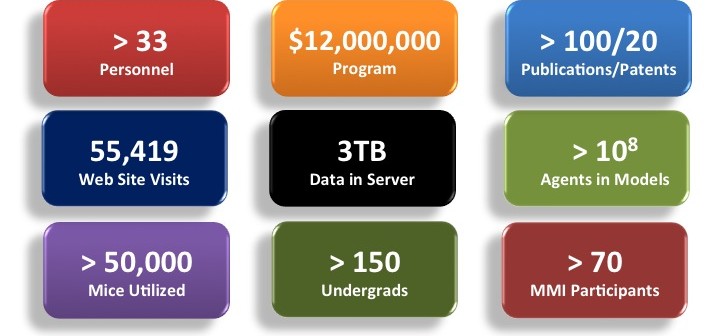Our Mission
To comprehensively and systematically characterize mechanisms of action underlying infectious, metabolic and autoimmune diseases; The NIMML Institute will translate this new scientific knowledge to identify new therapeutic targets and develop innovative therapeutics for human diseases that are safer and more effective.
Our Vision
To become a world-leading transdisciplinary research institute that combines advanced computational methods with preclinical, translational and clinical research and development.
Our Values
Be bold and decisive in solving the world’s most pressing challenges.
Never give up in finding disease treatments.
Be solution-oriented in the face of problems.
Do the Impossible to address the unmet needs of patients.
About NIMML
The NIMML Institute is a 501 (c) (3) non-profit public charity foundation focused on a transdisciplinary, team-science approach to precision medicine at the interface of immunology, inflammation, and metabolism. The NIMML Institute team has led numerous large-scale transdisciplinary projects and is dedicated to solving important societal problems by combining the expertise of immunologists, computational biologists, toxicologists, modelers, translational researchers, and molecular biologists. The central integrative theme of NIMML Institute is the view of the immune system as a massively and dynamically interacting system and the application of novel advanced computational methods to unravel its complexity and accelerate the discovery and characterization of novel pathways to enable the development of new classes of therapeutics for autoimmune, infectious, and chronic inflammatory diseases.
NIMML History
NIMML was founded in 2002 under the guidance of Dr. Bassaganya-Riera and Dr. Hontecillas. The NIMML Institute is committed to transdisciplinary, team-science approaches with a personalized medicine focus at the interface of immunology, inflammation, and metabolism. The NIMML research programs incorporate drug development, nutritional immunology, immunometabolism, computational immunology, and clinical and translational research in autoimmune, infectious, and chronic inflammatory diseases. The scope of NIMML’s research ranges from in silico and in vitro studies to mechanistic, translational and Phase 1-4 clinical trials.
The NIMML research has pioneered platforms applying high-throughput computational, experimental immunology techniques, and system biology approaches in translational immunology research and discovery. Through the NIAID-funded Center for Modeling Immunity to Enteric Pathogens under the Modeling Immunity for Biodefense (MIB) program, the NIMML applied advanced computational approaches to analyze high-dimensional, high-throughput datasets, model and simulate human immunology systems and help immunologists conduct in silico experiments to develop a more mechanistic experimental design, validate hypotheses and save significant time and laboratory cost.

1. Focus: NIMML’s research areas include drug development, nutritional immunology, immune mediated disease, infectious disease, chronic diseases, and computational immunology
2. Team: NIMML is composed of over 30 active lab members trained in immunology, biochemistry, microbiology, engineering, bioinformatics, computer science, mathematics, and physics
3. Portfolio: NIMML has a growing research funding portfolio exceeding $15 million, with over 100 publications, and 20 patents and applications
4. MIEP: NIMML’s houses the Center for Modeling Immunity to Enteric Pathogens (MIEP) one of four NIAID-funded centers in Modeling Immunity for Biodefense (MIB)
5. Unique Style: NIMML integrates computational modeling with experimental approaches to develop innovative therapeutics for human diseases
1. Developing powerful tools to quantitatively understand the dynamics of complex immunological systems
2. Identifying and validating novel therapeutic targets for infectious, immune mediated and chronic inflammatory/metabolic diseases- examples include: type two diabetes (T2D), Helicobacter pylori, inflammatory bowel disease (IBD)
3. Discovering how diet and nutritional factors influence the immune responses, thereby regulating health and disease outcomes
4. Conducting translational research integrating computational modeling with novel experimental approaches
5. Enabling students to excel in translational research and reach their career goals in environments such as Amazon, QIAGEN, University of California Berkley, Feinstein
6. Creating innovative pipelines for drug development to identify and test the efficacy and safety of new compounds by applying molecular and systems modeling, testing the mechanism of action in animal models of disease, and conducting human clinical trials to validate the results of animal models

